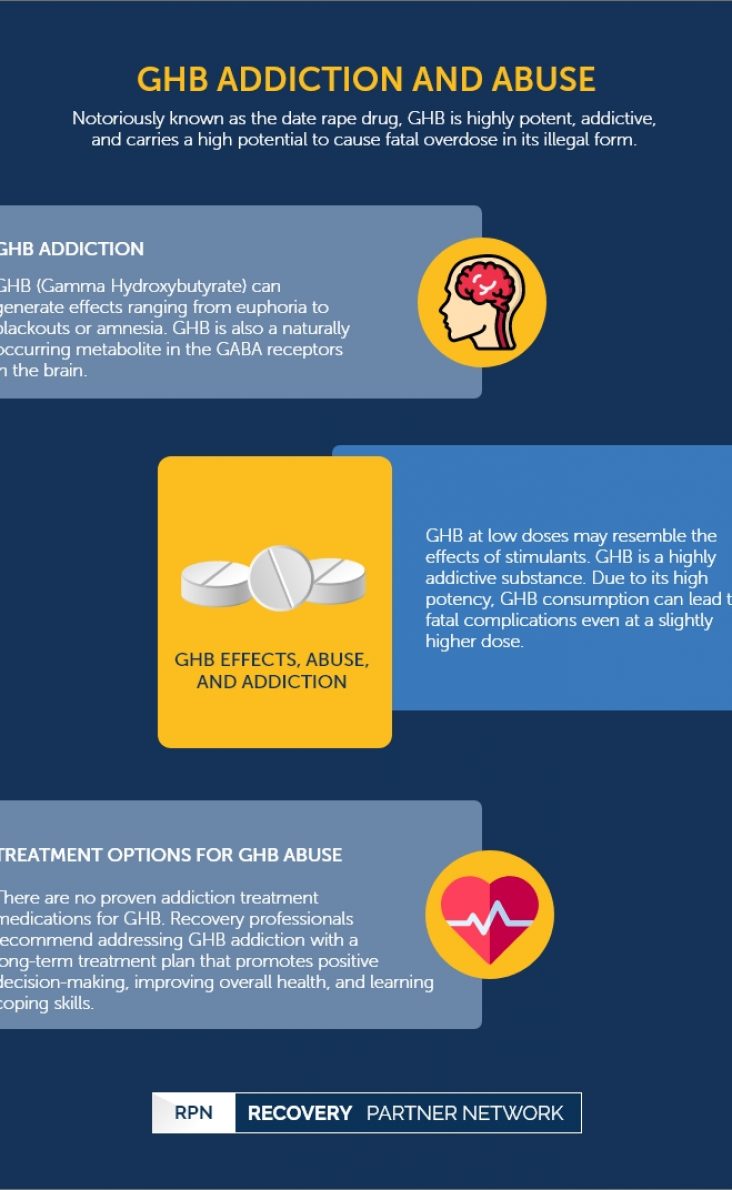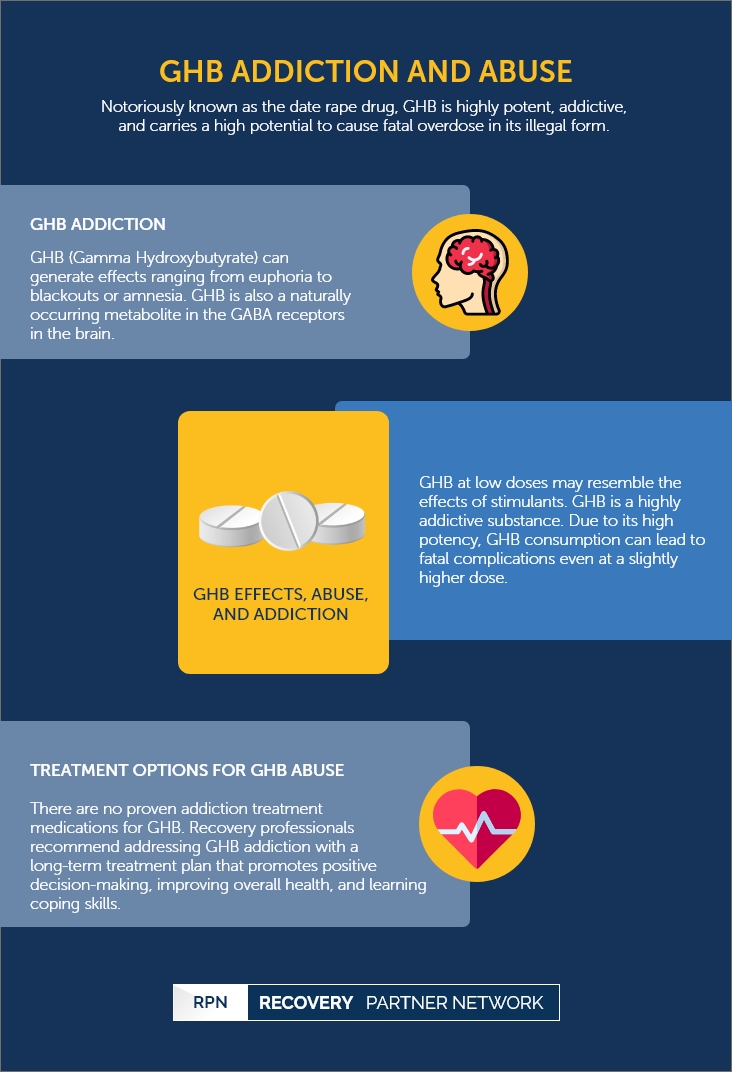Notoriously known as the date rape drug, GHB is highly potent, addictive and carries a high potential to cause fatal overdose in its illegal form.
GHB Addiction and Abuse
Illicit drugs
- Ayahuasca addiction – Abuse
- Baclofen addiction
- Black tar heroin addiction
- Cannabis addiction
- Cocaine dependence
- Crack cocaine addiction
- DMT addiction abuse treatment
- Does Marijuana Kill Brain Cells?
- Ecstasy addiction
- Gabapentin addiction
- gamma-Hydroxybutyric acid addiction
- Hallucinogen
- Heroin addiction
- Illicit drug addiction
- Inhalant addiction
- Cocaine
- Ketamine addiction
- Lysergic acid diethylamide addiction
- Mescaline addiction
- Methamphetamine addiction
- Meth Labs: Cooking up Addiction
- Meth Mouth
- Microdosing
- Phencyclidine addiction
- Psilocybin mushroom addiction
- Sage of the diviners – Addiction
- Shooting Heroin
- Shooting Methamphetamine
- Smoking Cannabis
- Speedball
- Synthetic cannabinoids
gamma-Hydroxybutyric acid addiction | Table of Contents
What is GHB?
GHB or Gamma Hydroxybutyrate (C4H8O3) can generate effects ranging from euphoria to blackouts or amnesia. GHB is also a naturally occurring metabolite in the GABA receptors in the brain. However, this chemical is naturally produced at very low levels compared to the levels found in GHB drugs. GHB was categorized as a Schedule I Substance under the Controlled Substance Act in March 2000.
The chemical compound was initially popular as a surgical anesthetic in the 1960s and then as a fat burner and party drug during the 1980s. Although the FDA approved Xyrem® (a medication with GHB for treating narcolepsy) in 2002, it is categorized and strictly regulated as a Schedule III substance that requires patients to enroll in restricted access programs to acquire the drug.
Illicit GHB is manufactured by street drug producers and mostly marketed on the Internet as a hallucinogen. These drugs may resemble an odorless, colorless liquid or white powder that may taste salty or soapy. GHB mostly gained its popularity in the club and electronic music scenes. While some use the drug for its alcohol-like effects, others use it to burn fat and build muscles. GHB is commonly used by high school and college students, partygoers, and body builders. However, this drug is also used by sexual predators to commit crimes against unsuspecting victims as this drug causes them to lose consciousness and mobility. In some cases, GHB is known to cause amnesia in victims, leaving them unaware of what happened to them. The use of GHB for sexual assault resulted in GHB being labeled as a date rape drug.
FAQ
Bodybuilders historically used GHB as a dietary supplement as it could trigger the release of growth hormones. Presently it is prescribed for patients who are excessively drowsy during the daytime due to narcolepsy. GHB is also used in the treatment of cataplexy, alcoholism and as a general anesthetic in medical settings. It’s most concerning use is as a date rape drug.
The reaction to the drug is highly unpredictable. In large doses, a person can experience loss of consciousness, respiratory depression, vomiting, and even death.
GHB Effects, Abuse, and Addiction
GHB at low doses may resemble the effects of stimulants, although it is a central nervous system (CNS) depressant. The effects of GHB are activated 10 to 20 minutes after oral consumption. GHB half-life consists of 30 to 60 minutes. The quick metabolization of GHB in the liver makes this drug hard to detect in urine after 24 hours. GHB is generally abused for its intoxicating effects.
A few of the short-term effects of GHB are:
- Clumsiness
- Confusion
- Exhaustion
- Euphoria
- Headache
- Low body temperature
- Seizures
- Nausea
- Vomiting
- Sweating
- Sluggishness
The long-term health consequences of GHB abuse is yet unknown, as further studies are still being conducted.
Since most of the GHB consumed in the US is produced illegally, it is impossible to know the purity of each dose without testing it in a laboratory. However, the difference between a low dose and a potentially lethal dose of GHB may be relatively small.
The street names of GHB may include:
- Gamma oh
- Georgia Home Boy
- Great Hormones at Bedtime
- Grievous Bodily Harm
- Growth Hormone Booster
- Liquid Ecstasy
- Liquid X
- Salty Water
- Sleep
- Vita G
GHB is a highly addictive substance that can cause adverse withdrawal symptoms. Regular consumption of GHB, even at low doses, can cause the formation of dependence and tolerance. Due to its high potency, GHB consumption, even at a slightly higher dose, can lead to fatal complications.
FAQ
- How does GHB affect people?
- Are there long-term effects associated with the use of GHB?
- Can the negative effects of GHB be avoided in lower doses?
GHB is a depressant that slows down the nerve messages moving between the brain and the body. Some of the typical after-effects of GHB include euphoria, drowsiness, tremors, enhanced libido, nausea, lowered inhibitions.
Research has depicted that the frequent use of GHB use, especially to the degree of unconsciousness following the use of the drug, is linked with brain changes, which causes negative effects on the working memory, IQ, long-term memory, and could lead to higher levels of stress and anxiety.
There is no safe dose for drugs like GHB. GHB and other illicit drugs can trigger life-threatening side effects due to the chemicals they contain. There is no safe dose when it comes to street drug consumption.
The Dangers of Mixing GHB with Alcohol and GHB Overdose
In 2012, the Food and Drug Administration (FDA) issued an advisory against the use of GHB medications with other CNS depressants. GHB is lethal enough on its own, but it can quickly become fatal when combined with other CNS depressants, including opioids, alcohol, benzodiazepines, and barbiturates. When taken together, it can cause respiratory depression and fatal overdose. Individuals who are experiencing a GHB overdose may simply look like they are falling asleep. However, in reality, they are slowly losing their ability to breathe.
Symptoms of a GHB overdose may include:
- Headaches
- Nausea and vomiting
- Hallucinations
- Seizures
- A decrease in heart rate and breathing
- Amnesia
- Loss of consciousness
- Coma
- Death
Certain foods, beer, and wine contain low levels of GHB; the standard liter of wine contains between 4 mg and 21 mg of GHB. However, illegal GHB seized from clubs and street markets usually carry between 500mg and 3,000mg of GHB and carry a high potential to cause an overdose.
GHB Abuse Statistics
- Since 1990, only 72 deaths have been directly related to GHB, but experts believe that it is likely to be much higher.
- More than 16,000 GHB-related overdoses have occurred in the US since 1990.
- 1.2 million users aged 12 or older have attested to using GHB at least once in their life.
GHB Withdrawal
Individuals with a dependency on GHB may no longer be able to function on a daily basis without the use of the drug, as their body starts to rely on its effects. During abrupt cessation of consumption, patients may experience intense withdrawal symptoms due to the chemical imbalance caused.
Common GHB withdrawal symptoms include:
- Anxiety
- Insomnia
- Shaking
- Sweating
- Increased heart rate and blood pressure
- Psychosis
Treatment Options for GHB Abuse
Although some controlled doses of benzodiazepines, antidepressants, or anticonvulsants are prescribed during treatment, there are no proven addiction treatment medications for GHB. Recovery professionals recommend addressing GHB addiction with a long-term treatment plan that promotes positive decision-making, improving overall health, and learning coping skills. However, more research is being conducted to determine the benefits of behavioral therapy on GHB patients.
Due to the severity of withdrawal symptoms, patients are highly advised to seek professional and medical treatment options during detoxification. Committing detox by yourself can lead to fatal complications or relapse. Patients diagnosed with a severe addiction must seek further treatment at inpatient treatment programs after the completion of detox. Patients with a mild addiction may receive treatment at an outpatient treatment center.
Recovery Partner Network
We aim to educate and empower. If you feel our library of resources does not cover your specific need, reach out to us, and we would be happy to help.
STATISTICS
© Copyright 2025


